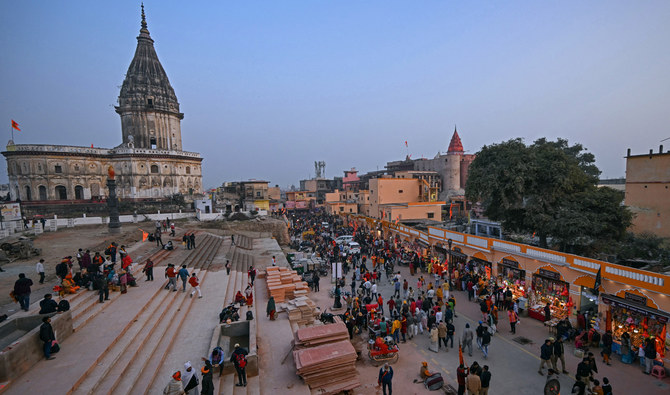NEW DELHI: A powerful Hindu group said several mosques in India were built over demolished Hindu temples, apparently hardening its stance in a decades-long sectarian dispute just days after a huge temple was inaugurated on the site of a razed mosque.
The comments from the Rashtriya Swayamsevak Sangh (RSS), the ideological parent of Prime Minister Narendra Modi’s Hindu-nationalist party, come after Modi and the RSS chief led Monday’s consecration of the temple on the site of a 16th-century mosque demolished by a Hindu mob in 1992.
The fight over claims to holy sites has divided Hindu-majority India, which has the world’s third-largest Muslim population, since independence from British rule in 1947.
Four days after the temple was inaugurated in the northern city of Ayodhya, a lawyer for Hindu petitioners said the Archaeological Survey of India had determined that a 17th century mosque in the Hindu holy city of Varanasi, in Modi’s parliamentary constituency, had been built over a destroyed a Hindu temple.
The Archaeological Survey did not respond to a request for comment.
Late on Friday, senior RSS leader Indresh Kumar questioned whether Varanasi’s Gyanvapi mosque and three others, including the razed one in Ayodhya on the site where many Hindus believe Lord Ram was born, were mosques at all.
“Whether we should consider them mosques or not, the people of the country and the world should think about it,” Kumar told Reuters in an interview, referring to the sites in Gyanvapi, Ayodhya, one other in Uttar Pradesh state and one in Madhya Pradesh. “They should stand with the truth, or they should stand with the wrong?“
In the group’s first reaction to the Gyanvapi findings, Kumar said, “Accept the truth. Hold dialogues and let the judiciary decide.”
Raising questions about the mosques does not mean Hindu groups comprise “an anti-mosque movement,” he said. “This is not an anti-Islam movement. This is a movement to seek the truth that should be welcomed by the world.”
‘Nothing political’
Muslim groups are disputing the assertions of Hindu groups in court.
Zufar Ahmad Faruqi, chairman of the Sunni Central Waqf Board in Uttar Pradesh, said the group “have confidence in the judiciary that it will do what is correct.
“We want to live in harmony and peacefully while protecting the monuments as they are,” he said. “Nothing political about it, we are in the court and facing it legally.”
The Modi-led opening of the Ayodhya temple fulfilled a 35-year-old pledge of his Bharatiya Janata Party ahead of a general election due by May. He is expected to win a third straight term, the longest stretch since India’s first prime minister, Jawaharlal Nehru.
The razing of the Ayodhya mosque sparked riots across India that authorities say killed at least 2,000 people, mostly Muslims. Hindu groups have for decades said that Muslim Mughal rulers built monuments and places of worship after destroying ancient Hindu structures.
Indian law bars the conversion of any place of worship and provides for the maintenance of the religious character of places of worship as they existed at the time of independence — except for the Ayodhya shrine. The Supreme Court is hearing challenges to the law.
The court this month halted plans for a survey of another centuries-old mosque in Uttar Pradesh, the country’s most populous and politically important state, to determine if it contained Hindu relics and symbols.
The RSS’s Kumar, who is also the chief patron of the group’s Muslim wing, said Islamic law requires mosques to be constructed on undisputed land, or the land should be donated by someone who has bought it or the people building the mosque should buy it.












